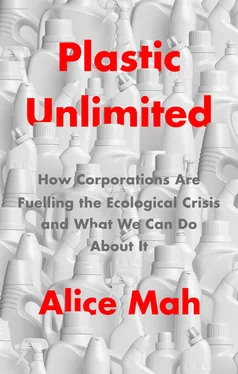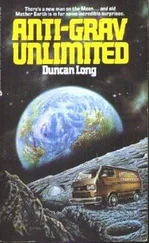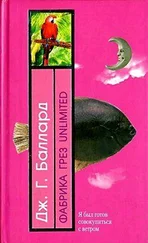While waste is the most obvious manifestation of plastic pollution, the root of the plastics problem is not waste but production. Even at the height of the storm of public outrage over marine plastic litter, amid all the single-use plastics bans and corporate-sponsored beach clean-ups, global demand for plastics was on the rise. The largest market for plastics is for packaging, accounting for approximately 40% of global end markets. The second largest market is for building and construction at 20%. 2New plastics markets are also rapidly proliferating in green technologies. According to the International Energy Agency (IEA), plastics will be the biggest driver of oil demand in the energy transition, reaching close to half of global oil demand by 2050. 3Yet the increasing demand for plastics cannot keep up with the insatiable corporate drive for petrochemical expansion.
The petrochemical industry makes plastics from raw material ‘feedstocks’, which are derived from fossil fuels and other hydrocarbons through a process known as ‘cracking’, applying heat and pressure to break down heavy hydrocarbons into lighter molecules. Petrochemical expansion relies on (1) access to cheap and abundant ‘virgin’ (fossil fuel-based) feedstocks; and (2) continual growth in new plastics markets to absorb expanding production. The petrochemical industry is a cyclical industry, with boom-and-bust cycles of expansion and overcapacity. 4In the decade leading up to the COVID-19 pandemic, there was a surge of petrochemical project investments around the world, linked to a range of factors including the availability of cheap liquefied natural gas (LNG) from fracking in the United States, the drop in oil prices in 2014, diversification into plastics from oil-producing countries (anticipating the energy transition), and strong GDP growth in China. 5By the end of 2019, the petrochemical industry was heading into a downcycle. However, the COVID-19 pandemic delayed the predicted crisis of overcapacity. 6The price of crude oil hit historic lows, new petrochemical projects stalled, and recycled plastic feedstocks became more expensive. Meanwhile, corporations used the health crisis to reverse single-use plastic bans and to roll back sustainability commitments. Demand for single-use plastics in packaging and personal protective equipment rocketed, offsetting short-term losses in other plastics markets, such as automotive products and appliances. 7‘Looking forward, we’re looking at fat margins,’ a US industry executive commented in 2021. ‘Not just in North America but around the world.’ 8
What can we do to stop the escalating plastics crisis? Despite the global momentum to address plastic pollution, policymakers have failed to challenge the capitalist imperative for unlimited plastics growth. We need to tackle this challenge head on. As a first step, let’s take a closer look at the plastic facts.
Within just a few years, the media landscape has become filled with facts about plastic. In December 2018, the fact that ‘9% of all plastic ever made has been recycled’ was named the ‘statistic of the year’ by the British Royal Statistical Society. 9Between 1950 and 2015, 8.3 billion metric tonnes of plastic were produced globally, 6.5 billion metric tonnes of which became plastic waste. Of that waste, 79% went to landfill or was leaked into the environment, 12% was incinerated, and 9% was recycled. Half of all plastic ever manufactured has been made since 2000. 10The cumulative total of plastics production is expected to increase to the staggering amount of 34 billion metric tonnes by 2050, by which point plastic is predicted to outweigh fish in the oceans. 11It is almost impossible to grasp these numbers, even with handy infographics about how many times around the earth we could line up all the plastic bags and bottles.
All plastics are polymers, meaning ‘many parts’ in Greek, made up of long chains of molecules with repeated units. Plastic polymer chains are composed of strong carbon bonds that can be combined with chemical additives to make just about anything. Petrochemicals derived from fossil fuels are used to make 99% of plastics, 12and plastics markets account for 80% of petrochemical production. 13Five main polymers make up 90% of all single-use plastics: polypropylene (PP); high-density polyethylene (HDPE); low-density polyethylene (LDPE); linear low-density polyethylene (LLDPE); and polyethylene terephthalate (PET). 14The material qualities that make plastics so useful also make them flawed: everlasting, hydrocarbon-dependent, and easily fused with other substances. Instead of breaking down on a molecular level, plastics fragment into tiny pieces and persist in the environment. Our bodies and ecosystems are filled with petrochemicals and microplastics. Every stage of the plastics lifecycle, from extraction to refining to consumption and waste, poses significant risks to human health. 15Plastics production releases toxic substances that are linked to cancer, neurological damage, and reproductive and developmental problems. 16Toxic plastic pollution disproportionately impacts low-income and minority ethnic communities around the world. 17Millions of animals are killed by plastics every year, primarily through starvation and entanglement. 18The global environmental, health, and economic costs of plastic pollution are incalculable.
The list of facts goes on, all available with the tap of a finger on the Web. Unlike with global heating, there are no deniers of the plastics crisis. It is too tangible and traceable. Big brands Coca-Cola, PepsiCo, and Nestlé have been singled out by ‘Break Free From Plastic’ activists as the world’s worst plastic polluters, based on an annual audit of hundreds of thousands of plastic items collected by volunteers. 19Further upstream along the plastics value chain, a report by the Minderloo Foundation revealed that twenty major plastics producers (led by ExxonMobil, Dow, and Sinopec) accounted for more than half of all single-use plastic waste generated globally in 2019, and 100 accounted for more than 90%. 20Instead of deniers, there are detractors: people who dismiss the plastics crisis as a distraction from the climate crisis, or who insist that it is eminently solvable through improving recycling and waste management systems.
Many plastic facts are widely accepted, while some are more contested. Researchers have pointed out that predictions of how many fish or plastics will be in the sea in the future, for example, are speculative and uncertain. 21The petrochemical and plastics industries have taken advantage of public uncertainty about plastic facts to repeatedly cast doubt on scientific evidence about plastic toxicity in order to protect their markets. 22They also claim that plastic packaging is more environmentally friendly than alternative materials, relying on assumptions about single-use packaging markets and consumer behaviour. 23Other plastic facts are open to selective interpretation, such as the finding in 2018 that 90% of plastic waste in the ocean comes from just ten rivers, eight in Asia and two in Africa. 24This led industry representatives to say: ‘We know where the source of the problem is,’ pointing to inadequate waste management infrastructure in these regions. 25However, their framing occludes another fact: the highly unequal global trade in contaminated plastic waste. The largest exporters of plastic waste are the United States, Germany, and Japan. Since China announced a ban on plastic waste imports in 2017, global waste exports have been redirected to countries in Southeast Asia, which have struggled to cope with the inundation. 26Several of these countries have returned contaminated shipments, and Thailand and Vietnam have announced plans to ban all plastic imports, but the traffic continues. 27The global plastic waste trade is the latest frontier of ‘waste colonialism’, a term that politicians and activists have used to describe the unjust international trade in hazardous waste. 28
Читать дальше












